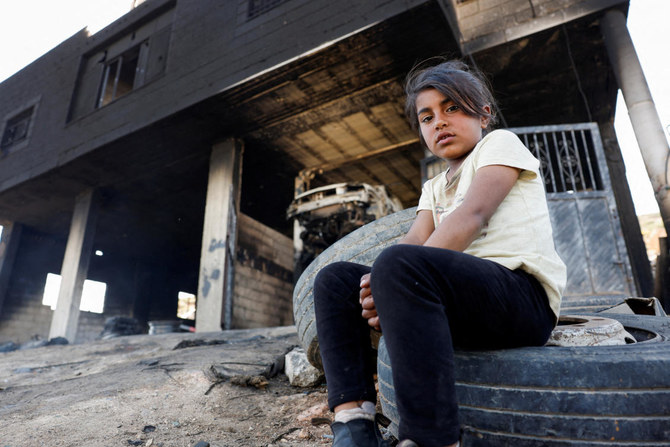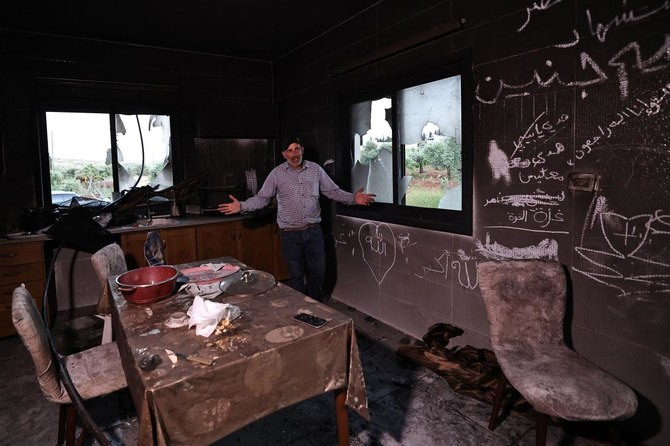RAFAH, Gaza Strip: Israeli strikes on the southern Gaza city of Rafah overnight killed 22 people, including 18 children, health officials said Sunday, as violence flared in the occupied West Bank.
The latest bombardments came as the US House of Representatives approved $13 billion in new Israeli military aid even as global criticism mounts over the death toll and dire humanitarian crisis in Gaza.
However, fears of wider war breaking out in the Middle East have eased somewhat after Iran downplayed Israel’s reported retaliation over its unprecedented missile and drone attack on the country a week ago.
Attention has turned back toward the war in Gaza, which Israel hit with several strikes overnight, according to the Palestinian territory’s Civil Defense agency.
Israel has carried out near-daily air raids on Rafah, where more than half of Gaza’s population of 2.3 million has sought refuge from fighting elsewhere. It has also vowed to expand its ground offensive against the Hamas militant group to the city on the border with Egypt despite calls for restraint, including from the US.
“In the coming days, we will increase the political and military pressure on Hamas because this is the only way to bring back our hostages and achieve victory. We will land more and painful blows on Hamas — soon,” Prime Minister Benjamin Netanyahu said in a statement. He didn’t give details.
The first Israeli strike in Rafah killed a man, his wife and their 3-year-old child, according to the nearby Kuwaiti Hospital, which received the bodies. The woman was pregnant and the doctors saved the baby, the hospital said. The second strike killed 17 children and two women from an extended family.
Resident Umm Hassan Kloub, 35, said her children screamed when they “woke up to a nightmare of an explosion.”
“Every second we live in terror, even the sound of Israeli aircraft doesn’t stop,” she said.
“We don’t know whether we will live or die. This is not life.”
“These children were sleeping. What did they do? What was their fault?” asked one relative, Umm Kareem. Mohammed Al-Beheiri said that his daughter, Rasha, and her six children, the youngest 18 months old, were among those killed. A woman and three children were still under the rubble.
The Israel-Hamas war has killed more than 34,000 Palestinians, according to local health officials, at least two-thirds of them children and women. It has devastated Gaza’s two largest cities and left a swath of destruction. Around 80 percent of the territory’s population have fled to other parts of the besieged coastal enclave.
The $26 billion aid package approved by the US House of Representatives on Saturday includes around $9 billion in humanitarian assistance for Gaza, which experts say is on the brink of famine. The US Senate could pass the package as soon as Tuesday, and President Joe Biden has promised to sign it immediately.
The conflict, now in its seventh month, has sparked regional unrest pitting Israel and the US against Iran and allied militant groups across the Middle East. Israel and Iran traded fire directly this month, raising fears of all-out war.
Tensions have also spiked in the Israeli-occupied West Bank. Israeli troops killed two Palestinians who the military says attacked a checkpoint with a knife and a gun near the southern West Bank town of Hebron early Sunday. The Palestinian Health Ministry said that the two killed were 18 and 19, from the same family. No Israeli forces were wounded, the army said.
Later, the military said its forces shot dead a 43-year-old Palestinian woman after she tried to stab a soldier in the northern West Bank near Beka’ot settlement.
The Palestinian Red Crescent rescue service said that it had recovered 14 bodies from an Israeli raid in the Nur Shams urban refugee camp in the West Bank that began late Thursday. Those killed include three militants from the Islamic Jihad group and a 15-year-old boy.
The military said it killed 14 militants and arrested eight suspects. Ten Israeli soldiers and one border police officer were wounded.
In a separate incident in the West Bank, an Israeli man was wounded in an explosion on Sunday, the Magen David Adom rescue service said. A video circulating online shows a man approaching a Palestinian flag planted in a field. When he kicks it, it appears to trigger an explosive device.
Israel blames Hamas for civilian casualties because the militants fight in dense, residential neighborhoods. The military rarely comments on individual strikes, which often kill women and children. The military says it has killed more than 13,000 Hamas fighters, without providing evidence.
US military aid
Much of the new military assistance approved by the US House of Representatives on Saturday was expected to be used to reinforce Israel’s air defenses.
Israel welcomed the aid, while Hamas condemned it as a “green light” for continued Israeli “aggression.”
The US bill said that more than $9 billion will also be earmarked to address “the dire need for humanitarian assistance for Gaza as well as other vulnerable populations around the world.”
The boost for Israel’s defenses comes after almost all of the more than 300 missiles and drones that Iran launched toward the country a week ago were intercepted, according to the Israeli military.
Israel had vowed to respond to Iran’s first-ever attack on its territory, which was itself retaliation for a deadly April 1 strike on Iran’s embassy consular annex in Damascus.
Iran blamed Israel for that attack.
Israel’s response appeared to come on Friday when explosions were reported in the central Iranian province of Isfahan.
Israeli officials have made no public comment, and Iranian Foreign Minister Hossein Amir-Abdollahian downplayed the incident.
He told NBC News that Tehran would not respond “as long as there is no new adventure on behalf of the Israeli regime against Iran’s interests.”
On Sunday, Israel said it will hold a “protest talk” with ambassadors from several United Nations Security Council members which voted for the “State of Palestine” to become a full UN member.
France, Japan and others backed the bid which the United States vetoed.
Israel has faced growing global opposition to the war, which has turned vast areas of Gaza into rubble while a siege has left residents without enough water, food, medicines and other vital supplies.
The population “faces famine, malnutrition, and infectious disease outbreaks,” the International Rescue Committee charity warned this week.
Prime Minister Benjamin Netanyahu has also come under pressure within Israel, including to reach a deal for the release of hostages still held by Hamas. Israel estimates 129 captives remain in Gaza, including 34 who the military says are dead.
Families of the hostages were among thousands attending an anti-government protest in Tel Aviv on Saturday night.
Ofir Angrest, whose brother Matan was kidnapped on October 7, called for Jewish Israelis to leave an empty chair at their traditional Seder meals marking the beginning of the holiday Passover on Monday.
“Enough! After more than six months, you’re simply disrespecting me and the families of the hostages,” Angrest said, adding that he was addressing the Israeli cabinet.
(With Agencies)





























